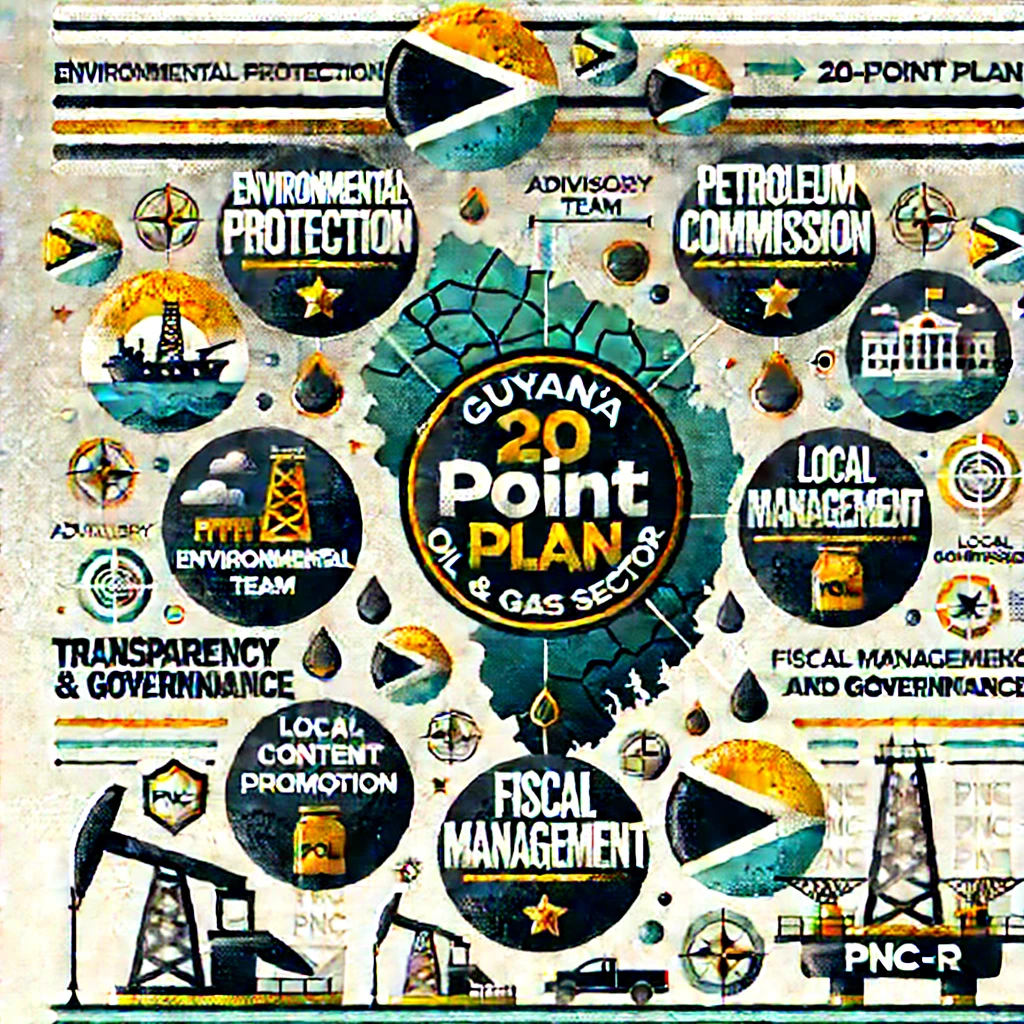Every Man, Woman and Child in Guyana Must Become Oil-Minded – Column 138 – September 28, 2024
After years of dithering and delays, the People’s National Congress Reform (PNC-R) recently unveiled a 20-point plan – more a statement of intent – for managing Guyana’s fast-moving oil and gas sector. This plan, coming eight years after the signing of the 2016 Petroleum Agreement by the PNCR-led coalition, and after four years of silence and ambivalence from Aubrey Norton as Leader of the Opposition, represents at best a promise to review rather than act. While the plan outlines a comprehensive set of policies and strategies, it also raises questions about its effectiveness in addressing the fundamental issues which the country faces with respect to the sector.
Strengths of the Plan
The plan demonstrates a commendable attempt to address a number of aspects of oil and gas sector management with firm statements on:
- The proposed establishment of an Advisory Team (AT) of professionals within 90 days of taking office will bring much-needed expertise to the government’s decision-making process. This interdisciplinary approach, including specialists in business, law, economics, and engineering, among others, could lead to more informed and holistic policymaking.
- The establishment of an independent Petroleum Commission which strengthens governance, enhance oversight and reduce political interference in the sector’s management.
- On environmental protection, including the reinstatement of full liability coverage and prohibition of gas flaring, and concerns about the industry’s environmental impact.
- The emphasis on capacity building, skills development, and involvement of the diaspora in the oil and gas sector could potentially boost local content and expertise over time.
- The commitment to transparency, including the publication of information protocol, which would restore public trust and enhance accountability in the sector.
- The proposal for an independent Inspector General’s (IG) Office with a 24/7 anonymous hotline is a novel idea to address concerns about corruption and improprieties, if properly staffed by honest professionals.
- A formal feasibility study to determine the viability of creating a National Oil Company (NOC) and/or a local refinery is not without some merit, but the lessons of Trinidad and Tobago should give us pause.
Limitations and Concerns
Unfortunately, these positive developments are undermined by an equal number and arguably more serious limitations on key issues, such as:
- Paying the taxes for the oil companies: It is mindboggling that the PNC-R is not insulted by this effrontery. In this day and age, how can any government pay the taxes of any company at the expense of the country’s public servants and services? What was needed on this issue is immediate advocacy for the Government to sign the OECD/G20 Tax Framework which would bring in immediate and substantial revenues and restore some decency to the arrangement.
- Royalties: This is a non-renewable resource and once Exxon and its mates have walked away with the lion’s share of oil revenue, Guyanese will have to live with the consequences, including the environmental implications. All for 2%!
- Ringfencing: This is elementary and common in the oil sector, follows the matching concept in accounting, and is permissible under existing legislation. What is there for the PNC-R to review and consider? Does it know that come the end of 2027 the matter will be moot since the Exploration Licence will have expired?
- Local Content: Seemingly unaware that local content was part of the mid-eighties legislation, the plan does not establish policies, strategies and targets for increasing resident Guyanese participation in the industry. Its nemesis also boasts of local content legislation but ignores the fact that this only succeeds with robust supervision and weeding out the pervasive “Guyanese for sale” practice used blatantly to circumvent the legislation.
- Revenue Management: The plan’s approach to the Natural Resource Fund (point 17) is vague, seemingly not sufficiently informed, merely committing to a review and potential restructuring. Given the critical importance of managing oil revenues for Guyana’s development and intergenerational savings, this point warranted more detailed treatment.
- Stability Clause Unaddressed: Equally disappointing is the failure to confront the 40-year stability clause in the current agreement, which not only limits Guyana’s ability to adjust to new and unforeseen developments but more seriously, places a fetter on the powers conferred by the Constitution on the National Assembly to make, amend and repeal laws in the nation’s interest. One has to assume that this is no accidental omission, and it places the PNC-R in the same position as the PPP/C – the dubious embrace of sanctity of contract over permanent sovereignty over natural resources and the primacy of the Constitution.
- Renegotiation: Nothing disappoints about this plan like the failure to commit to contract renegotiation as and when circumstances warrant. While point 10 mentions a “top-to-bottom review” of the 2016 Stabroek Block Production Sharing Agreement (PSA), the plan is silent on this singular opportunity afforded under the Agreement to address the disastrously fundamental imbalances in the current agreement.
- Vague Language: Many points in the plan use non-committal language such as “review,” “evaluate,” and “study,” without any commitment to action. This ambiguity and timidity, even if accidental, can easily accommodate to inaction or minimal change if the PNCR comes to power.
- Timeline and Implementation: While the plan sets a 90-day timeline for establishing the Advisory Team, which is as far as it goes on any timeline or implementation strategies. You can never miss a non-deadline!
To be concluded Next Week











